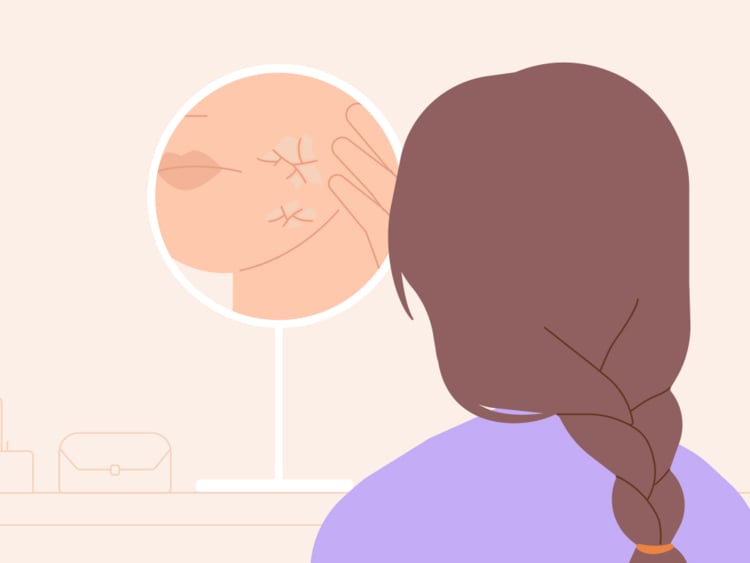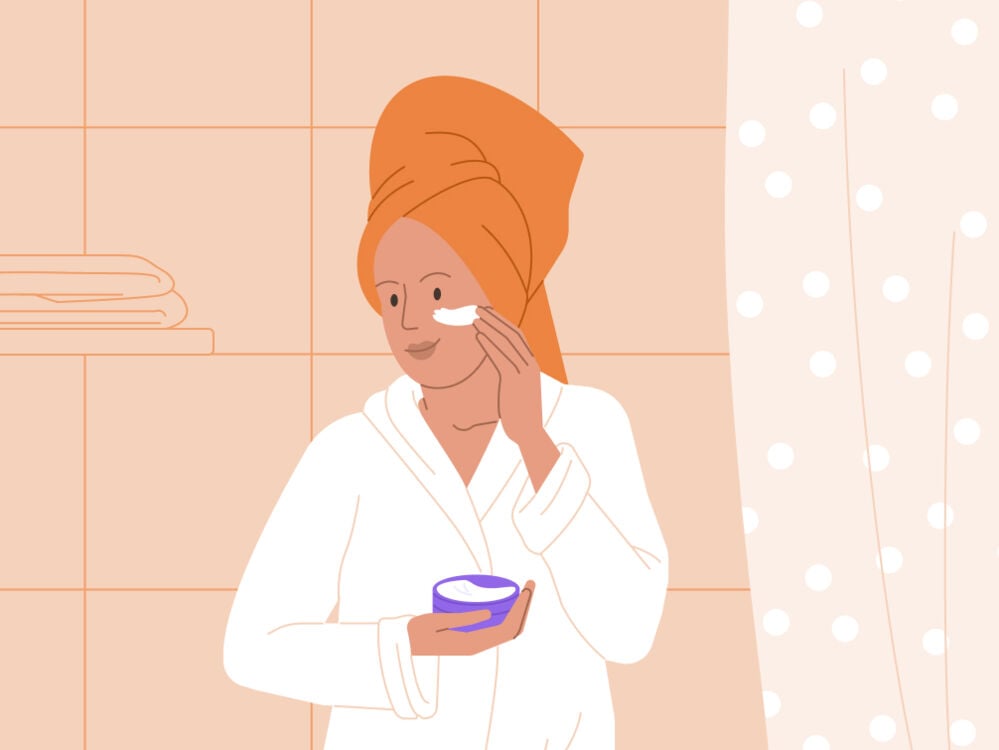It’s common for your skin to dry out as you approach menopause, thanks to a change in hormones. Here’s how you can care for it.
-
Tracking cycle
-
Getting pregnant
-
Pregnancy
-
Help Center
-
Flo for Partners
-
Anonymous Mode
-
Flo app reviews
-
Flo Premium New
-
Secret Chats New
-
Symptom Checker New
-
Your cycle
-
Health 360°
-
Getting pregnant
-
Pregnancy
-
Being a mom
-
LGBTQ+
-
Quizzes
-
Ovulation calculator
-
hCG calculator
-
Pregnancy test calculator
-
Menstrual cycle calculator
-
Period calculator
-
Implantation calculator
-
Pregnancy weeks to months calculator
-
Pregnancy due date calculator
-
IVF and FET due date calculator
-
Due date calculator by ultrasound
-
Medical Affairs
-
Science & Research
-
Pass It On Project New
-
Privacy Portal
-
Press Center
-
Flo Accuracy
-
Careers
-
Contact Us
How to soothe dry skin caused by perimenopause


Every piece of content at Flo Health adheres to the highest editorial standards for language, style, and medical accuracy. To learn what we do to deliver the best health and lifestyle insights to you, check out our content review principles.
Does your skin feel unusually dry, tight, and itchy lately? Or perhaps cracks have appeared on your hands and feet, your skin is a little flaky, or you’ve started to notice more fine lines and wrinkles around your eyes?
Dry skin is a common complaint at any age, and a number of things could be causing it. Heating in your home, humidity levels, or eczema could all dry out your skin.
But, if you’re somewhere between your late 30s and your 50s, there could be another culprit behind your dryness: perimenopause, the years leading up to menopause being confirmed. This is especially likely if your periods have also been hard to track lately (Flo can help with that) or you’ve had other telltale signs of perimenopause, such as hot flashes, night sweats, and mood swings.
Menopause is a natural process that most women go through. Not everyone struggles during this time (and in the lead-up to it), but for some people, symptoms such as dry, itchy skin or acne can arise — and they can be difficult to navigate. So you’re not alone if you’re feeling fed up. The good news is that with the right treatment, most perimenopause symptoms are manageable — you don’t just have to live with them.
Here, reproductive endocrinologist, obstetrician, and gynecologist Dr. Allison K. Rodgers, Illinois, US, shares everything you need to know about menopausal dry skin. If you want to know why it happens, when to see your doctor, and how to help keep your skin smooth, supple, and moisturized, read on.
Key takeaways
- More than half of women in one study reported problems with dry skin during perimenopause.
- It’s thought that changing estrogen levels are behind perimenopausal dry skin. Estrogen is one of the hormones that controls your menstrual cycle.
- Your skin loses 30% of its collagen within the first five years after having gone through menopause.
- Hormone therapy (HT, previously known as hormone replacement therapy or HRT) has been found to help perimenopause symptoms in many people — and a positive side effect can be soothing dry skin. Chat with your doctor to decide whether it could be right for you.
- Simple lifestyle tips, including moisturizing regularly and using a broad-spectrum SPF, may help to ease dry skin, so try to make these things part of your skin care routine.
Take a quiz
Find out what you can do with our Health Assistant
Why does menopause cause dry skin?
Everyone is unique when it comes to health — menopause included. That’s why no two people have the exact same symptoms, but changes to your skin are pretty common as your body gears up for menopause (aka perimenopause).
Confusingly, perimenopause and menopause are often used interchangeably, but they’re actually two different life stages. Perimenopause is the name given to the years leading up to when menopause is confirmed (which is the official term for the year after your final period). Perimenopause usually begins somewhere between your late 30s and 50s but happens most often in your 40s. Then, when you haven’t had a period for 12 months (usually between the ages of 45 and 55), you’re diagnosed as having gone through menopause. From then on, you are postmenopausal.
Just like other more widely known perimenopause symptoms such as hot flashes, sleep disturbances, and brain fog, dry skin can be largely due to the changing hormones. “The drop in [the sex hormones] estrogen and progesterone are the main [reasons for] the changes we see in our skin in the perimenopausal and menopausal periods,” explains Dr. Rodgers.
Estrogen is an important hormone in your menstrual cycle, but it plays a vital role in your skin’s ability to hold moisture in, too. During perimenopause, your estrogen levels start to go on a bit of a roller coaster ride, going up and down for a while before they eventually start to reduce for good when you reach menopause itself. Dropping levels of estrogen can cause your skin to become less elastic and quite dehydrated. In turn, you may notice skin changes such as dryness, dark spots, and breakouts, explains Dr. Rodgers.

Many women also experience a dip in collagen and elastin levels around this time. “Collagen is a protein that is very common in our bodies and helps with support and structure,” explains Dr. Rodgers. “It helps our skin be firm and elastic.” When collagen declines, your skin might become thinner and more fragile, and you might start to notice fine lines and wrinkles.
All these changes can also affect the way your skin heals itself. “With a loss of collagen and elastin and the drop in estrogen levels, skin becomes thinner, which increases the chances of trauma, such as bruising, because skin cells are made more slowly, and it takes a long time to heal,” Dr. Rodgers adds.
Does hormone therapy help dry skin?
You might have heard people talk about using hormone therapy to counter many of the symptoms some people start to notice during menopause. Dry skin is one of those symptoms, so raising your estrogen and progesterone levels can help to boost moisture and improve skin changes during perimenopause, says Dr. Rodgers. Research has also found that HT can increase collagen — an added bonus — which may help to reduce fine lines and wrinkles.
As with many things, there are pros and cons of hormone therapy. “Because of some of the risks of HT, we don’t typically put patients on it for just skin changes,” explains Dr. Rodgers. “It’s important to talk to your [health care] provider to make sure that the benefits of hormone replacement therapy outweigh the risks.” It’s right for some people but less so for others. Chat with your doctor about it, and they can help you decide whether it’s a good option for you.
What helps dry skin during perimenopause?
If you’re struggling with dry, cracked, or itchy skin, some of these perimenopause dry skin relief tips might help. Just make sure you speak with your doctor first (it’s always best to get their advice because they’ll be able to understand your unique needs).
Moisturize after showering
To rehydrate thirsty skin, apply moisturizing cream while your skin is still damp. This helps to lock in moisture, says Dr. Rodgers. “I recommend fragrance-free moisturizers, especially after showering or bathing,” she says. “Vitamin C can also be added topically [externally], which can help with maintaining collagen and holding in moisture.” And as for that multi-step skin care regimen you’ve been following? It might be time for a rethink. “Some people will use retinol to help with wrinkles, but this can cause further drying to the skin,” warns Dr. Rodgers.
Limit hot baths and showers
Hot water can irritate dry skin, so resist the temptation to lounge in the tub for hours. Taking long baths or showers everyday strips your skin’s natural oils, making it drier and itchier. Opt for shorter showers in lukewarm water no more than once a day instead.
Protect your skin from the sun
Don’t forget to protect your skin from the sun’s harmful rays. “Use sunscreen to prevent further damage and moisturize,” says Dr. Rodgers. Look for a broad spectrum cream to apply every day, even in winter. “I definitely recommend that my patients use sunscreen with a high SPF on their face and other exposed areas,” she adds.
Use gentle facial cleansers
Your skin often becomes more sensitive during perimenopause, so it’s important to avoid anything that is likely to cause irritation. Soap tends to strip away natural oils, so switch to a soap substitute or mild cleanser instead. Again, it’s a good idea to avoid heavily perfumed skin care products that contain harsh chemicals (unless they’ve been prescribed by your doctor).
Quit smoking
Smoking can increase most perimenopausal symptoms, says Dr. Rodgers, so now would be a good time to quit. Smoking can cause “increasing hot flashes and a quicker decline in estrogen,” she explains, adding: “People who use nicotine also have worsening skin symptoms and worse wrinkles.”
Drink plenty of water to keep well hydrated
Our bodies are made up of 60% water, but dropping estrogen levels during perimenopause can affect your sense of thirst, meaning we drink less. Further research is needed to understand the link between hydration and dry skin conditions, but drinking plenty of water is always important for good health. The amount of fluids you’ll need to consume (from eating as well as drinking) to keep your hydration levels topped up will vary from person to person but generally, the recommended amount is about 11.5 cups (2.7 liters) per day.
Get as much sleep as you can
Beauty sleep is not a myth, folks. Research has found a link between sleep and how hydrated you are, which is great if you’re able to get regular rest night after night. However, if you — like many people, thanks to insomnia, night sweats, young children, or whatever else — tend to bank less than the recommended seven hours per night, you may be more likely to wake up dehydrated. So, if you want to look (and feel) your best, do your best to get enough rest.
Speak to your doctor or dermatologist
Thanks to your hormone levels being all over the place, acne can develop during perimenopause for exactly the same reason as it does in puberty.
This type of hormonal acne is often caused by lower levels of estrogen, which means you make more sebum (oil), leading to a breakout. However, at the other end of the scale, dry skin gets irritated easily, which also increases your risk of acne. Over-the-counter treatments can help, or ask your doctor to refer you to a specialist.
Does dry skin go away after menopause?
Research is still ongoing, and experts don’t yet fully understand skin changes during perimenopause, but as you age, it’s natural to experience fine lines, wrinkles, thinning, and dark spots. “Unfortunately, menopausal skin continues to worsen throughout our lives,” explains Dr. Rodgers.
It’s something that happens to everyone, which hopefully makes you feel a little better about how your skin is changing. But if it’s getting you down, that’s completely valid. Book an appointment with your health care provider. They’ll be able to provide advice and direct you to a skin specialist or dermatologist should you need to see one.
If you’re struggling with perimenopause symptoms like dry skin, chatting with others going through the same thing can make you feel less alone. You can do exactly that in Flo’s safe community space, Secret Chats. Download the app to get involved in these conversations and keep note of your symptoms, your cycles, and more.
More FAQs
Is dry skin related to low estrogen?
Estrogen is a sex hormone that helps to keep your sexual and reproductive health in check. But it also plays an important role in skin health, including keeping moisture levels in check. If your hormones fluctuate for any reason — such as perimenopause — and your estrogen levels start dropping, this can lead to dry skin.
Is coconut oil good for your skin after menopause?
Coconut oil is often touted as the natural solution to dry skin conditions, but it’s not recommended for use on your face. The plant-based oil is highly comedogenic, which means it could clog your pores and cause acne. So stick to slathering it on your body instead.


Hey, I'm Anique
I started using Flo app to track my period and ovulation because we wanted to have a baby.


The Flo app helped me learn about my body and spot ovulation signs during our conception journey.


I vividly
remember the day
that we switched
Flo into
Pregnancy Mode — it was
such a special
moment.
Real stories, real results
Learn how the Flo app became an amazing cheerleader for us on our conception journey.
References
“10 Skin Care Habits That Can Worsen Acne.” American Academy of Dermatology Association, www.aad.org/public/diseases/acne/skin-care/habits-stop. Accessed 18 June 2024.
Akdeniz, M., et al. “Does Dietary Fluid Intake Affect Skin Hydration in Healthy Humans? A Systematic Literature Review.” Skin Research and Technology, vol. 24, no. 3, Aug. 2018, pp. 459–65, doi:10.1111/srt.12454.
Bravo, Bruna, et al. “Dermatological Changes during Menopause and HRT: What to Expect?” Cosmetics, vol. 11, no. 1, Jan. 2024, p. 9, https://doi.org/10.3390/cosmetics11010009.
“Caring for Your Skin in Menopause.” American Academy of Dermatology Association, 20 Nov. 2023, www.aad.org/public/everyday-care/skin-care-secrets/anti-aging/skin-care-during-menopause.
“Collagen.” Cleveland Clinic, my.clevelandclinic.org/health/articles/23089-collagen. Accessed 18 June 2024.
“Dermatologists” Cleveland Clinic, my.clevelandclinic.org/health/articles/12165-dermatologists-skin-care-doctors. Accessed 18 June 2024.
“Dry Skin.” Mayo Clinic, 25 Aug. 2023, www.mayoclinic.org/diseases-conditions/dry-skin/diagnosis-treatment/drc-20353891.
“Estrogen.” Cleveland Clinic, my.clevelandclinic.org/health/body/22353-estrogen. Accessed 18 June 2024.
“Hormone Therapy for Menopause.” The American College of Obstetricians and Gynecologists, Oct. 2021, www.acog.org/womens-health/faqs/hormone-therapy-for-menopause.
Khunger, Niti, and Krati Mehrotra. “Menopausal Acne: Challenges and Solutions.” International Journal of Women’s Health, vol. 11, Oct. 2019, pp. 555–67, doi: 10.2147/IJWH.S174292.
“Menopause.” World Health Organization, 17 Oct. 2022, www.who.int/news-room/fact-sheets/detail/menopause.
“Menopause: Symptoms.” NHS, www.nhs.uk/conditions/menopause/symptoms/. Accessed 18 June 2024.
“Perimenopause.” Cleveland Clinic, my.clevelandclinic.org/health/diseases/21608-perimenopause. Accessed 18 June 2024.
“Perimenopause.” Mayo Clinic, 25 May 2023, www.mayoclinic.org/diseases-conditions/perimenopause/symptoms-causes/syc-20354666.
Rosinger, Asher Y., et al. “Short Sleep Duration Is Associated with Inadequate Hydration: Cross-Cultural Evidence from US and Chinese Adults.” Sleep, vol. 42, no. 2, Feb. 2019, https://doi.org/10.1093/sleep/zsy210.
Rzepecki, Alexandra K., et al. “Estrogen-Deficient Skin: The Role of Topical Therapy.” International Journal of Women’s Dermatology, vol. 5, no. 2, June 2019, pp. 85–90, doi:10.1016/j.ijwd.2019.01.001.
“Sebaceous Glands.” Cleveland Clinic, my.clevelandclinic.org/health/body/24538-sebaceous-glands. Accessed 18 June 2024.
“Should You Use Coconut Oil on Your Skin?” Cleveland Clinic, Dec. 2022, https://health.clevelandclinic.org/coconut-oil-for-skin.
Stachenfeld, Nina S. “Hormonal Changes during Menopause and the Impact on Fluid Regulation.” Reproductive Sciences, vol. 21, no. 5, May 2014, pp. 555–61, doi:10.1177/1933719113518992.
Stevenson, Susan, and Julie Thornton. “Effect of Estrogens on Skin Aging and the Potential Role of SERMs.” Clinical Interventions in Aging, vol. 2, no. 3, Sep. 2007, pp. 283–97, doi:10.2147/cia.s798.
Vaillant, L., and A. Callens. “[Hormone Replacement Treatment and Skin Aging].” Therapie, vol. 51, no. 1, Jan.-Feb. 1996, pp. 67–70, pubmed.ncbi.nlm.nih.gov/8762222.
“Water: How Much Should You Drink Every Day?” Mayo Clinic, 12 Oct. 2022, www.mayoclinic.org/healthy-lifestyle/nutrition-and-healthy-eating/in-depth/water/art-20044256.
Water Science School. “The Water in You: Water and the Human Body.” US Geological Survey, 22 May 2019, www.usgs.gov/special-topics/water-science-school/science/water-you-water-and-human-body.
Watson, Nathaniel F., et al. “Recommended Amount of Sleep for a Healthy Adult: A Joint Consensus Statement of the American Academy of Sleep Medicine and Sleep Research Society.” Sleep, vol. 38, no. 6, June 2015, pp. 843–44, doi:10.5665/sleep.4716.
“Wrinkles.” Cleveland Clinic, my.clevelandclinic.org/health/diseases/10984-wrinkles. Accessed 18 June 2024.
Zouboulis, C. C., et al. “Skin, Hair and Beyond: The Impact of Menopause.” Climacteric, vol. 25, no. 5, Oct. 2022, pp. 434–42, doi: 10.1080/13697137.2022.2050206.
History of updates
Current version (20 June 2024)
Published (20 June 2024)
In this article

Track your perimenopause journey in the Flo app
-
Log symptoms and get tips to manage them
-
Learn what to expect with expert-led articles and videos
-
Connect with others who can relate to how you're feeling




